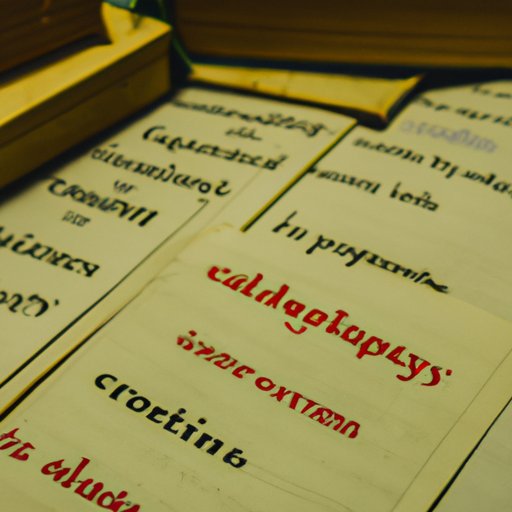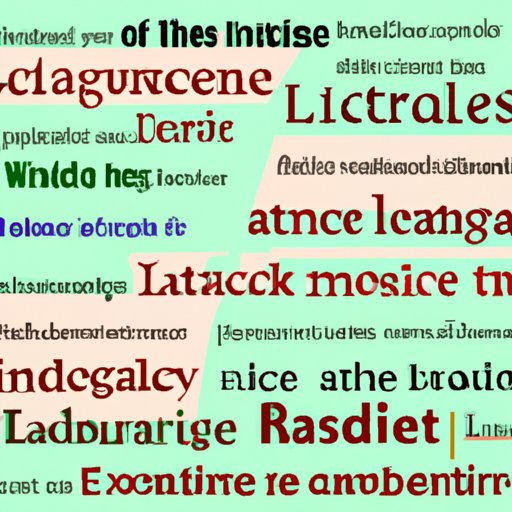Introduction
Classic literature is a term used to describe books that have become timeless works of art. It is often associated with authors such as William Shakespeare, Jane Austen, and Charles Dickens, but it can also refer to any work of literature that has stood the test of time. In this article, we will explore the definition, characteristics, and impact of classic literature.
An Overview of Classic Literature: Definition, Characteristics and Examples
The term “classic literature” can be defined as books that have been widely accepted by readers and critics alike as being of high literary merit. These books are typically written by renowned authors and are considered to be some of the finest works of literature in history. Classic literature is often characterized by its universal themes, timelessness, and lasting appeal.
Definition of Classic Literature
Classic literature is generally defined as works of fiction or non-fiction that have been around for over 50 years and are still widely read and studied. These works are often recognized for their cultural, historical, or aesthetic importance and are considered to be of high literary merit. They can include novels, short stories, plays, poems, and essays.
Characteristics of Classic Literature
Classic literature is often characterized by its timelessness and universal themes. The themes explored in these works can range from love and romance to war and conflict, and they often reflect the values and beliefs of the culture in which they were written. Additionally, classic literature often features complex characters, intricate plots, and vivid imagery that make them memorable and engaging to readers.
Examples of Classic Literature
Some of the most well-known examples of classic literature include William Shakespeare’s Romeo and Juliet, Jane Austen’s Pride and Prejudice, Charles Dickens’ Great Expectations, Mark Twain’s The Adventures of Huckleberry Finn, and George Orwell’s 1984. Other examples of classic literature include Homer’s The Odyssey, Dante’s The Divine Comedy, Leo Tolstoy’s War and Peace, Virginia Woolf’s To the Lighthouse, and Ernest Hemingway’s The Old Man and the Sea.

A Historical Perspective: How Classic Literature Has Evolved Over Time
Classic literature has evolved over time, reflecting the changing values and beliefs of different cultures. In this section, we will take a look at how classic literature has evolved throughout history.
Ancient Greek and Roman Classics
Ancient Greek and Roman classics are some of the earliest examples of classic literature. These works were written by renowned authors such as Homer, Virgil, and Sophocles and are often characterized by their exploration of human nature and morality. Some of the most famous ancient Greek and Roman classics include Homer’s The Iliad and The Odyssey, Virgil’s The Aeneid, and Sophocles’ Oedipus Rex.
Medieval Classics
During the Middle Ages, classic literature took on a more religious tone as writers sought to explore the relationship between faith and morality. Some of the most famous medieval classics include Dante’s The Divine Comedy, Geoffrey Chaucer’s The Canterbury Tales, and John Milton’s Paradise Lost.
Renaissance Classics
Renaissance classics focused on the idea of humanism, which emphasized the individual’s potential and worth. These works often explored the power dynamics between individuals and societies, as well as the tension between reason and emotion. Some of the most famous Renaissance classics include William Shakespeare’s Hamlet, Miguel de Cervantes’ Don Quixote, and John Bunyan’s The Pilgrim’s Progress.
Modern Classics
Modern classics are often characterized by their exploration of contemporary issues and social change. These works often focus on topics such as gender roles, racial inequality, and class divisions. Some of the most famous modern classics include F. Scott Fitzgerald’s The Great Gatsby, Harper Lee’s To Kill a Mockingbird, and J.D. Salinger’s The Catcher in the Rye.

Exploring Themes in Classic Literature
Classic literature often explores universal themes that are relevant to all cultures and eras. In this section, we will take a look at some of the common themes found in classic literature.
Love and Romance
One of the most common themes explored in classic literature is love and romance. From William Shakespeare’s Romeo and Juliet to Jane Austen’s Pride and Prejudice, many classic works feature star-crossed lovers and enduring relationships. These stories often explore the power of love and its ability to transcend obstacles and societal boundaries.
War and Conflict
Another common theme explored in classic literature is war and conflict. Many classic works, such as Homer’s The Iliad and Leo Tolstoy’s War and Peace, feature battles and wars as a way to explore themes such as courage, honor, and patriotism. These works often serve as a reminder of the devastating effects of war and the fragility of peace.
Social Change
Classic literature often explores the idea of social change and the struggle between tradition and progress. Many works, such as George Orwell’s 1984 and Aldous Huxley’s Brave New World, feature dystopian societies that are in danger of losing their humanity due to oppressive governments and extreme technological advancement. These stories often serve as a warning against the dangers of unchecked power.
Power Dynamics
Classic literature also often explores the power dynamics between individuals and societies. Authors such as William Golding in Lord of the Flies and Harper Lee in To Kill a Mockingbird examine how power can lead to corruption and injustice, while other works such as Mark Twain’s The Adventures of Huckleberry Finn explore the idea of freedom and the power of friendship. These stories often serve as a reminder of the need for balance between power and justice.

Understanding the Impact of Classic Literature
Classic literature has had a profound impact on society, influencing our understanding of the world and inspiring creativity. In this section, we will take a look at some of the ways in which classic literature has impacted our culture.
Examining Cultural Values
Classic literature often reflects the values and beliefs of the culture in which it was written. By examining these works, we can gain insight into the values and beliefs of past cultures and compare them to our own. This can help us to understand our own culture and develop an appreciation for the diversity of values and beliefs across cultures.
Influencing Society
Classic literature has also had a profound influence on society. Many classic works, such as Harriet Beecher Stowe’s Uncle Tom’s Cabin and Upton Sinclair’s The Jungle, have served as catalysts for social reform and inspired people to fight for social justice. These works remind us of the power of literature to shape and influence society.
Inspiring Creativity
Lastly, classic literature has had a major influence on modern literature and art. Many modern authors and artists draw inspiration from classic works, incorporating elements of classic literature into their own works. This helps to ensure that classic literature remains alive and relevant to modern audiences.
Analyzing the Influence of Classic Literature on Modern Writing
Classic literature has had a major influence on modern writing, inspiring authors to incorporate elements of classic literature into their own works. In this section, we will take a look at some of the ways in which classic literature has influenced modern writing.
Incorporating Elements of Classic Literature
Modern authors often draw inspiration from classic literature, incorporating elements such as character archetypes, plot structures, and themes into their own works. For example, many modern fantasy novels draw heavily from the works of J.R.R. Tolkien, while many modern detective novels draw from the works of Arthur Conan Doyle. By incorporating elements of classic literature, modern authors are able to create stories that are both original and timeless.
Drawing on Traditional Structures
Many modern authors also draw on traditional structures when crafting their stories. For example, many modern novels follow a three-act structure, with a beginning, middle, and end. This structure is often seen in classic works such as Homer’s The Odyssey and William Shakespeare’s Hamlet. By drawing on traditional structures, modern authors are able to create stories that are both familiar and engaging.
Developing New Narratives
Finally, modern authors often draw on classic literature to develop new narratives. By combining elements of classic literature with modern sensibilities, authors are able to create stories that are both innovative and timeless. For example, many modern science fiction novels blend elements of classic works such as Mary Shelley’s Frankenstein with modern ideas about technology and society.
Conclusion
In conclusion, classic literature is a term used to describe books that have become timeless works of art. These works are often characterized by their exploration of universal themes, timelessness, and lasting appeal. From ancient Greek and Roman classics to modern classics, classic literature has had a profound impact on society, influencing our understanding of the world and inspiring creativity. Additionally, classic literature has had a major influence on modern writing, inspiring authors to incorporate elements of classic literature into their own works. By exploring the definition, characteristics, and impact of classic literature, we can gain a better understanding of its importance and relevance in our lives.
Summary of Key Points
Classic literature is a term used to describe books that have become timeless works of art. These works are characterized by their exploration of universal themes, timelessness, and lasting appeal. Classic literature has evolved over time, reflecting the changing values and beliefs of different cultures. Additionally, classic literature has had a profound impact on society, influencing our understanding of the world and inspiring creativity. Finally, classic literature has had a major influence on modern writing, inspiring authors to incorporate elements of classic literature into their own works.
Benefits of Studying Classic Literature
Studying classic literature has many benefits. It can help us to gain insight into the values and beliefs of past cultures, inspire us to fight for social justice, and encourage us to create stories that are both original and timeless. Additionally, it can help us to appreciate the beauty and complexity of language, and to develop a deeper understanding of the human experience. By studying classic literature, we can gain a greater appreciation for the power of storytelling and its ability to shape and transform our lives.
(Note: Is this article not meeting your expectations? Do you have knowledge or insights to share? Unlock new opportunities and expand your reach by joining our authors team. Click Registration to join us and share your expertise with our readers.)
